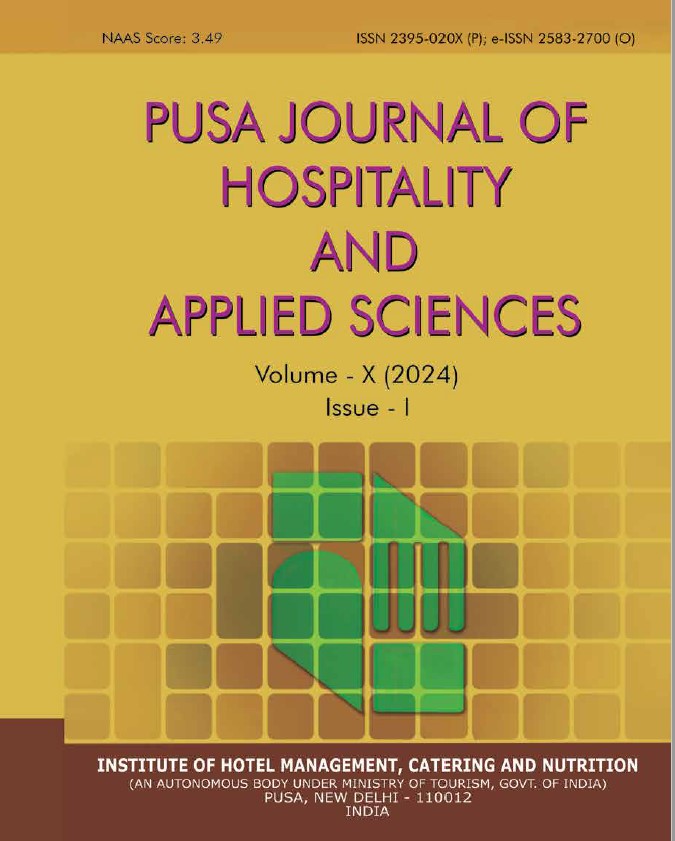Motivations Of Farm Stay Hosts And Guests: A Phenomenological Study
DOI:
https://doi.org/10.48165/pjhas.2023.9.1.4Keywords:
Farm Tourism, Positivistic, Horticulture, Interpretative, PhenomenologicalAbstract
Background: Studies pertaining farm tourism chiefly highlights positivistic methodologies and quantitative approaches. However, there is need to explore, describe and better understand the intricacies of tourism impacting the farm, the families and rural surroundings. Interpretative research methods are comprehensive and ease off compound understanding of human dynamics involved in farm tourism. This phenomenological study explores the farm tourism experiences in Shimla from the perspective of both hosts and guests. Objective:The aim of the study was to understand different motivations people have to run a farm tourism business, and what motivates visitors to seek holidays at these destinations. Methodology: The personal narratives of hosts interviewed clarified assumptions about the motives for embracing farm tourism, the most significant being meeting new people. Results: Findings suggest that tourists were motivated with the desire to unwind in the serene rural landscape and to learn about rural lifestyle infused with culture and Horti practices. Incidentally, the stimulus for both the classes were found to be highly coherent with each other indicating bright future of farm stay tourism in the region. Conclusion: Both guest and host motivations were found to be compatible indicating a prospective future for farm tourism.
References
Barbieri, C. (2009). An importance-performance analysis of the motivations behind agritourism and other farm enterprise developments in Canada. Journal of Rural and Community Development, 5(1–2), 1–20.
Barbieri, C., &Mshenga, P. (2008). The role of firm and owner characteristics on the performance of agritourism farms. SociologiaRuralis, 48(2), 166–183.
Berglund, H. (2007). Researching entrepreneurship as lived experience. In H. Neergaard & J. P. Ulhoi (Eds.), Handbook of qualitative research methods in entrepreneurship,(pp. 75–96).
Blossom Holidays – Orchard Tourism in Himachal (2014) himachaltourism.gov.in
Brandth, B., & Haugen, M. S. (2007). Gendered work in family farm tourism. Journal of Comparative Family Studies, 38(3), 379–393.
Brandth, B., & Haugen, M. S. (2011). Farm diversification into tourism—implications for social identity. Journal of Rural Studies, 27(1), 35–44.
Brookfield, H. (2008). Family farms are still around: Time to invert the old agrarian question. Geography Compass, 2(1), 108–126.
Brookfield, H., & Parsons, H. (2007). Family farms: Survival and prospect. Oxon: Routledge
Che, D. (2010). Value-added agricultural products and entertainment in Michigan's fruit belt. In G. Halseth, S. Markey, & D. Manson (Eds.), The next rural economies: Constructing rural place in global economies
Di Domenico, M., & Miller, G. (2012). Farming and tourism enterprise: Experiential authenticity in the diversification of independent small-scale farming. Tourism Management, 33, 285–294.
Dimitrovski, D. Leković1, M. & Joukes, V. (2019). A bibliometric analysis of Cross ref agritourism literature indexed in Web of Science
Fleischer, A., &Tchetchik, A. (2005). Does rural tourism benefit from agriculture? Tourism Management, 26(4), 493–501.
Haugen, M. S., & Vik, J. (2008). Farmers as entrepreneurs: A case of farm-based tourism. International Journal of Entrepreneurship and Small Business, 6(3), 321–336.
Ingram, G. (2014).Motivations of farm tourism hosts and guests in the South West Tapestry Region, Western Australia: Aphenomenological study.
Machum, S. (2005). The persistence of the family farming in the wake of agribusiness: A New Brunswick, Canada case study. Journal of Comparative Family Studies, 36(3), 377–390.
Malkanthi, S. H. P., & Routray, J. K. Visitor satisfaction in agritourism and its implications for agritourism farmers in Sri Lanka. International Journal of Agricultural Management.
McGehee, N. G., & Kim, K. (2004). Motivation for agri tourism entrepreneurship. Journal of Travel Research, 43(2), 161–170.
Mendoza, J. (2008). Understanding non-agricultural entrepreneurial activities developed by farmers in Canada 19. Morrison, A.M., Pearce, P.L., Moscardo, G., Nadkarni, N.,& O'Leary, J.T. (1996). Specialist accommodation: definition, markets served, and roles in tourism development. Journal of Travel Research, 35 (1), 18-26. 20. Nickerson, N. P., Black, R. J., & McCool, S. F. (2001). Agritourism: Motivations behind farm/ranch business diversification. Journal of Travel Research, 40(1), 19–26. 21. Nordquist, M., & Zellweger, T. M. (Eds.). (2010). Transgenerational entrepreneurship.
Ollenburg, C., & Buckley, R. (2007). Stated economic and social motivations of farm tourism operators. Journal of Travel Research, 45(4), 444–452.
Phelan, C., & Sharpley, R. (2011). Exploring agritourism entrepreneurship in the UK. Tourism Planning and Development, 8(2), 121–136.
Phillip, S., Hunter, C., & Blackstock, K. (2010). A typology for defining agritourism. Tourism Management, 31, 754–758.
Pollio, H.F., Henley, T.B. & Thompson, C.J. (1987). The phenomenology of everyday life
Rilla, E., Hardesty, S., Getz, C., & George, H. (2011). California agritourism operations and their economic potential are growing. California Agriculture, 65(2), 57–65.
Schweitzer, R. (1998). Phenomenology and qualitative research method in psychology
Sharpley, R., & Vass, A. (2006). Tourism, farming and diversification: An attitudinal study. Tourism Management, 27(5), 1040–1052.
Smith, J. A., Flowers, P., & Larkin, M. (2009). Interpretative phenomenological analysis: Theory, methods and research.
Statistical abstract of Himachal Pradesh 2019-20 Department of Economic and Statistics, Government of Himachal Pradesh Shimla
Suzanne, A. (2014). A Phenomenological Study of Agritourism Entrepreneurship on Ontario Family Farms 32. Sznajder, M., Przezborska, L., & Scrimgeour, F. (2009). Agritourism.
Sznajder, M., Przezborska, L., & Scrimgeour, F. (2009). Agritourism.
Tew, C., & Barbieri, C. (2012). The perceived benefits of agritourism: The provider's perspective. Tourism Management, 33, 215–224.
Williams, P. W., Lack, K., & Smith, K. C. (2004). Cultivating agritourism: Tools and techniques for building success.
Yang, Z., Cai, J., &Sliuzas, R. (2010). Agro-tourism enterprises as a form of multi-functional urban agriculture for peri-urban development in China. Habitat International, 34(4), 374– 385.




